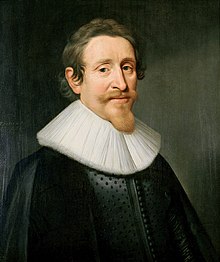
Back Grotius Afrikaans هوغو غروتيوس Arabic هوجو جروشيوس ARZ Hugo Grotius AST Hüqo Qrotsi Azerbaijani Гуга Гроцый Byelorussian Хуго Гроций Bulgarian হুগো গ্রোশিয়াস Bengali/Bangla Hugo Grotius Breton Hugo Grotius BS
Hugo Grotius | |
|---|---|
 Portrait of Hugo Grotius by Michiel Jansz. van Mierevelt, 1631 | |
| Born | 10 April 1583 |
| Died | 28 August 1645 (aged 62) |
| Alma mater | Leiden University |
| Era | Renaissance philosophy |
| Region | Western philosophy |
| School | Natural law, humanism |
| Academic advisors | Justus Lipsius |
Main interests | Philosophy of war, international law, political philosophy |
Notable ideas | Theory of natural rights, grounding just war principles in natural law, governmental theory of atonement |
| Signature | |
 | |
Hugo Grotius (/ˈɡroʊʃiəs/ GROH-shee-əss; 10 April 1583 – 28 August 1645), also known as Hugo de Groot[a] (Dutch: [ˈɦyɣoː də ˈɣroːt]) or Huig de Groot (Dutch: [ˈɦœyɣ də ˈɣroːt]), was a Dutch humanist, diplomat, lawyer, theologian, jurist, statesman, poet and playwright. A teenage prodigy, he was born in Delft and studied at Leiden University. He was imprisoned in Loevestein Castle for his involvement in the controversies over religious policy of the Dutch Republic, but escaped hidden in a chest of books that was regularly brought to him and was transported to Gorinchem.[4][5] Grotius wrote most of his major works in exile in France.
Grotius was a major figure in the fields of philosophy, political theory and law during the 16th and 17th centuries. Along with the earlier works of Francisco de Vitoria and Alberico Gentili, his writings laid the foundations for international law, based on natural law in its Protestant side. Two of his books have had a lasting impact in the field of international law: De jure belli ac pacis (On the Law of War and Peace) dedicated to Louis XIII of France and the Mare Liberum (The Free Seas) for which Grotius has been called the "father of international law."[6] Grotius has also contributed significantly to the evolution of the notion of rights. Before him, rights were, above all, perceived as attached to objects; after him, they are seen as belonging to persons, as the expression of an ability to act, or as a means of realizing something.
Peter Borschberg suggests that Grotius was significantly influenced by Francisco de Vitoria and the School of Salamanca in Spain, who supported the idea that the sovereignty of a nation does not lie simply in a ruler through God's will, but originates in its people, who agree to confer such authority upon a ruler.[7] It is also thought that Grotius was not the first to formulate the international society doctrine, but he was one of the first to define expressly the idea of one society of states, governed not by force or warfare but by actual laws and mutual agreement to enforce those laws. As Hedley Bull declared in 1990: "The idea of international society which Grotius propounded was given concrete expression in the Peace of Westphalia, and Grotius may be considered the intellectual father of this first general peace settlement of modern times."[8] Additionally, his contributions to Arminian theology helped provide the seeds for later Arminian-based movements, such as Methodism and Pentecostalism; Grotius is acknowledged as a significant figure in the Arminian–Calvinist debate. Because of his theological underpinning of free trade, he is also considered an "economic theologist".[9]
After fading over time, the influence of Grotius's ideas revived in the 20th century following the First World War.
- ^ Prof. dr hab. Edmund Kotarski, "Andrzej FRYCZ Modrzewski (Fricius Modrevius)" with bibliography. Virtual Library of Polish Literature. Retrieved September 28, 2011.
- ^ Ulam, Adam (1946). "Andreas Fricius Modrevius—A Polish Political Theorist of the Sixteenth Century". American Political Science Review. 40 (3): 485–494. doi:10.2307/1949322. ISSN 0003-0554. JSTOR 1949322. S2CID 146226931.
- ^ Howell A. Lloyd, Jean Bodin, Oxford University Press, 2017, p. 36.
- ^ Murray, John (1838). A hand-book for travellers on the continent: being a guide through Holland, Belgium, Prussia. BIBLIOBAZAAR. pp. 73. ISBN 1-117-07017-4.
- ^ Davies, Charles Maurice (2010). History of Holland, from the beginning of the tenth to the end of the Eighteenth Century, Volume 2. General Books. p. 539. ISBN 978-1-151-01164-0.
- ^ "Hugo Grotius | Dutch statesman and scholar | Britannica". www.britannica.com. Retrieved 21 April 2023.
- ^ Borschberg, Peter (2011), Hugo Grotius, the Portuguese and Free Trade in the East Indies, Singapore and Leiden, NUS Press & KITLV Press, ISBN 978-9971-69-467-8
- ^ Bull, Roberts & Kingsbury 2003.
- ^ Thumfart 2009.
Cite error: There are <ref group=lower-alpha> tags or {{efn}} templates on this page, but the references will not show without a {{reflist|group=lower-alpha}} template or {{notelist}} template (see the help page).